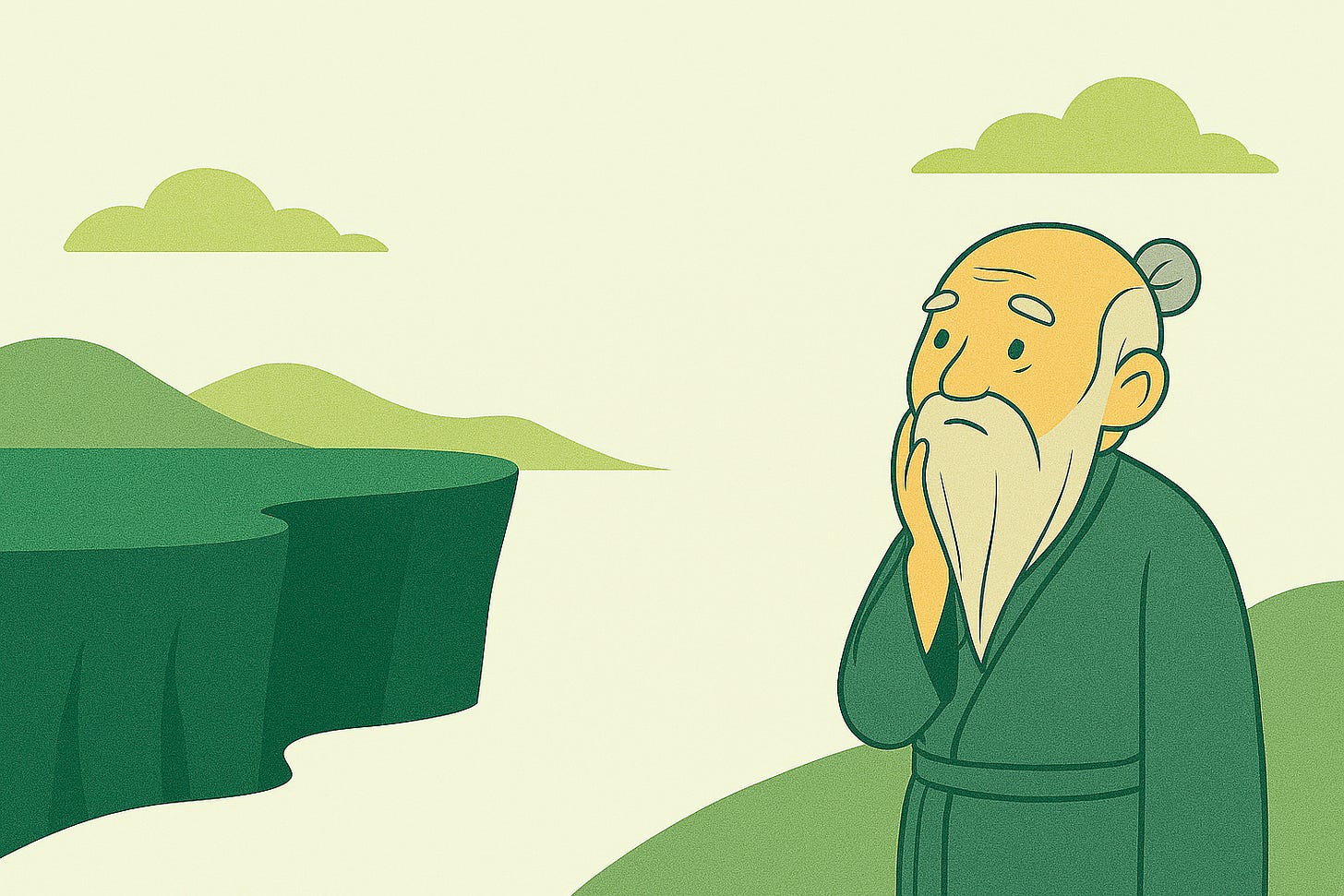We live in a culture terrified of the void.
Every silence is filled, every moment of stillness invaded. We scroll between notifications, stream soundtracks for every hour of the day, multitask….
We fill our schedules, our minds, our homes…
Emptiness has become synonymous with failure. We’ve been taught that fullness means value, productivity, progress.
And yet, beneath all the noise and accumulation, many feel disconnected — from themselves, from the world and from meaning.
But Taoist philosophy tells us that emptiness is not lack: it is capacity. Not failure, but potential.
“Thirty spokes share the wheel’s hub. It is the empty center hole that makes it useful.”
— Lao-Tzu, Dao De Jing, Chapter 11
The utility of the bowl lies in its hollow. The usefulness of a room lies in its space. The core of life is not what we accumulate, but what we allow.
In other words: what truly nourishes us is not the content we chase, but the openness we cultivate. To live well is not to fill every moment, but to clear space for life to unfold.
Emptiness as Perception
There’s a passage in the Wenzi, a lesser-known Taoist classic, that says:
“Only an empty mind is capable of reflecting things as they are.”
This is a striking idea. When we think of intelligence, we often think of knowledge, data, memory: a mind full of information.
But the wise mind is not full — it is clear. Not cluttered with preconceptions, but receptive. Like a mirror, it reflects reality without distortion.
The Zhuangzi tells the story of a man who tries so hard to shoot an arrow with precision that he fails over and over. When he forgets technique, forgets even himself, the arrow flies true. He doesn’t control the action — he lets it happen. This is the essence of Taoist skill: unforced clarity, born of emptiness.
What clutters the mind? Not just thoughts, but judgments. Categories. Opinions. Our inner narratives. To see truly, we must remove the filters.
“The perfect man uses his mind like a mirror — it does not cling, it does not reject, it receives, but does not hold.”
— Zhuangzi, Chapter 7
Let the mind be. Only the empty mind can truly see. Only the quiet mind can truly know.
Living the Void
What would it mean to live from emptiness — not as emptiness, but through it?
Taoism is not abstract philosophy. It is a guide for embodied life. Emptiness in Taoism is not numbness or apathy. It is not resignation. It is a quality of being — open, fluid, ungrasping. It is available to the moment, untouched by rigid expectation.
Zhuangzi describes the “true human beings of ancient times” as calm, spontaneous, impossible to upset or manipulate. Why? Because they were empty of fear, of desire for fame or gain, of self-importance.
“They were so free from the self, they could follow the transformations of the world without resistance.”
— Zhuangzi, Chapter 6
To live from emptiness means to stop grasping. It means making space — in your calendar, in your home, in your heart — not as an act of deprivation, but of wisdom.
We do not need more productivity hacks. We need more room.
More pauses.
More breath.
A full life is not one stuffed with doing. It is one sculpted by presence. Emptiness is not an absence — it is the condition for depth.
In practical terms, this might look like:
Leaving part of your day unscheduled and not rushing to fill it.
Listening to someone without preparing a reply.
Sitting in silence, to return to yourself.
And in time, the void becomes a friend.
Because the void is not what’s missing. It is what makes everything else possible.
With Gratitude



I really liked this. Emptiness is so much more than we often suppose it to be. Nothing is ever really "nothing". Any nothing is always some kind of space of possibility.
Re emptiness as perception, I think this insight runs much deeper still. Our eyes for example work via having a literal hole (the pupil) for the light to enter through. And I think our powers of imagination and consciousness both derive from a kind of emptiness too, with imagination coming from the imperfection of our memories and lack of knowledge of the future, and consciousness coming from our uncertainty and wonder.
It's these "holes" that make life so incredible. When we look only at what is, mind seems impossible, but when we look at what is not we see infinite possibilities.
(I wrote more about this in a post, if anyone is interested - https://open.substack.com/pub/thinkstrangethoughts/p/of-holes-and-souls-emptiness-minds?utm_source=share&utm_medium=android&r=1ackrk)
This is exactly what I needed to hear 🫶🏻